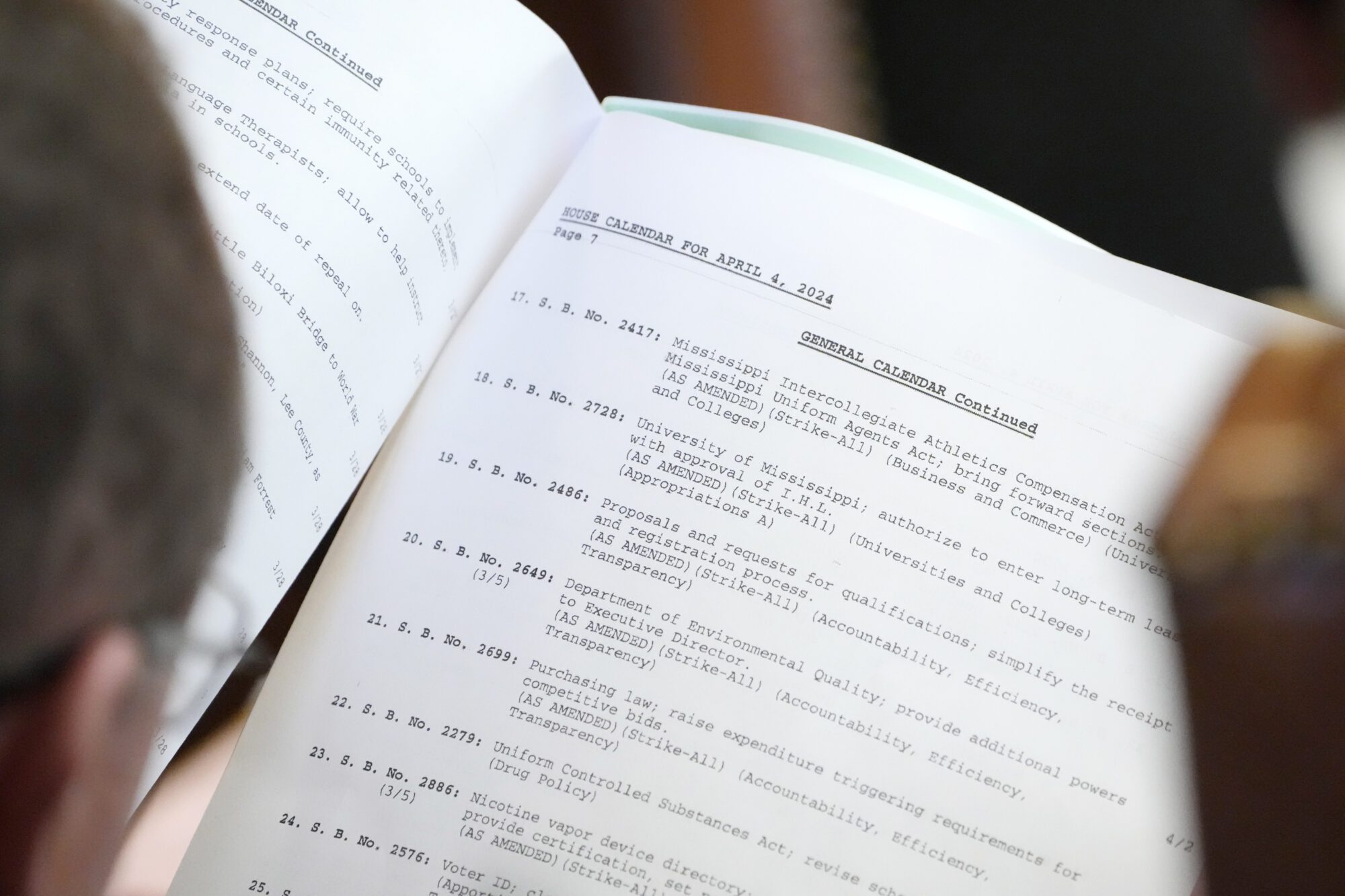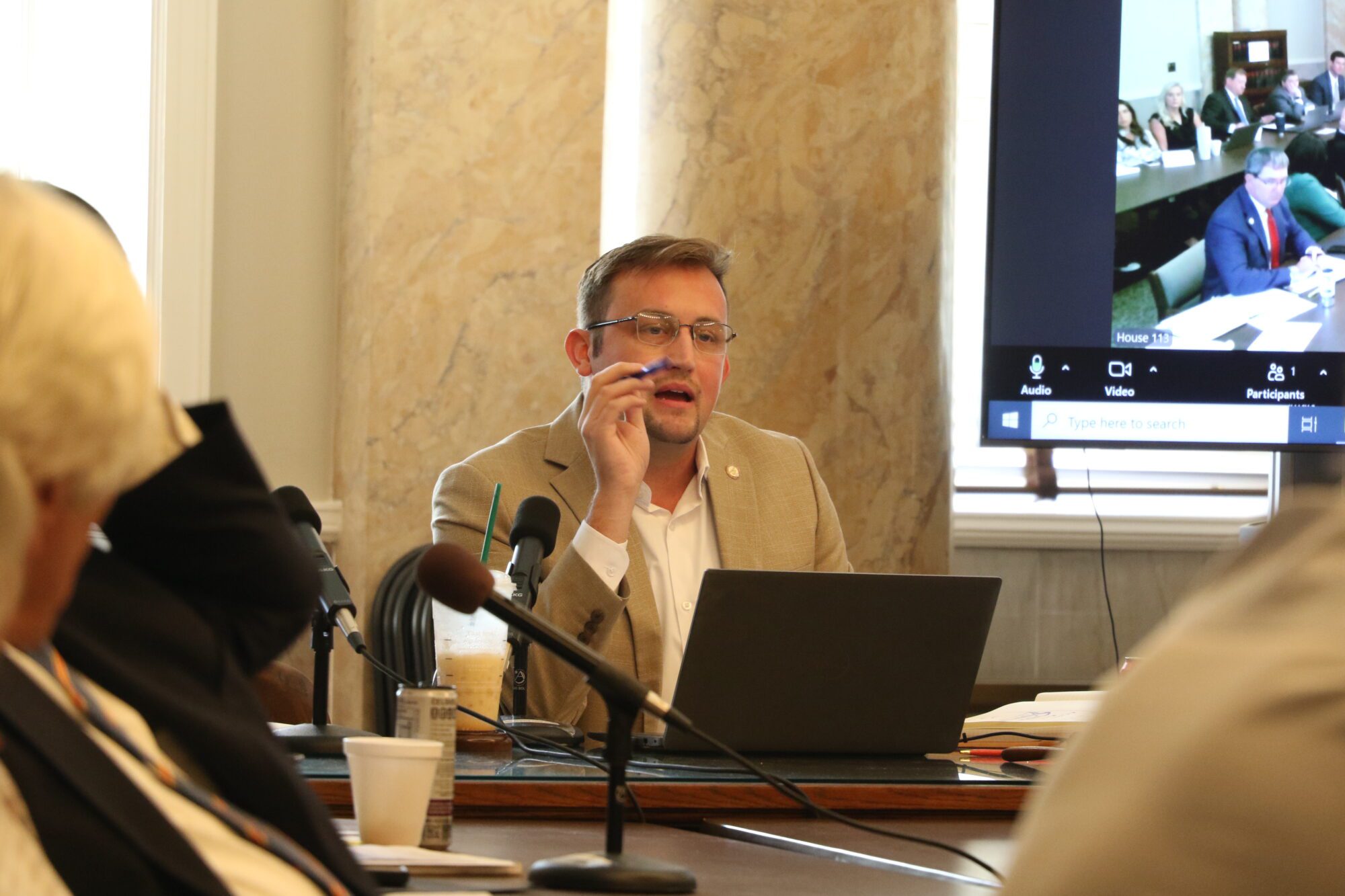
A member of the Mississippi State House of Representatives reads through the day's calendar of bills requiring action in the House chamber, Thursday, April 4, 2024, at the state Capitol in Jackson, Miss. (AP Photo/Rogelio V. Solis)
- Here’s a recap of the legislation that passed during the 2024 legislative session. See what impacts you and your family.
July 1 marks the beginning of a new fiscal year for the state of Mississippi, and along with that comes new laws that take effect after being passed during the 2024 legislative session and signed by Governor Tate Reeves.
Here is a list of some of the key pieces of legislation that becomes law on Monday in the Magnolia State:
New education funding formula
The “Mississippi Student Funding Formula” replaces the “Mississippi Adequate Education Program,” or MAEP, as the mechanism by which public schools will be funded annually.
According to previous reporting, the new Mississippi Student Funding Formula and this year’s appropriated total for education provides nearly $230 million more for K-12 schools, bringing the amount to roughly $2.96 billion.
The new formula provides base student funding of $6,695 in the first year, and increases in 2026, 2027, 2028 based on inflation. Beginning in 2029, and once every four years thereafter, the State Board of Education will recommend a new base student funding amount based on a new “objective formula” that factors in instructional, administrative and facility costs.
The legislation also creates a series of “weights” that increase the amount of funding available to students in certain categories considered more expensive to educate such as students identified as special needs, low income, and English language learners, among others.
Medicaid presumptive eligibility for pregnant mothers
Lawmakers passed a measure that provides pregnant women with presumptive eligibility for Medicaid. Presumptive eligibility refers to the process of granting Medicaid services to those who may qualify before their eligibility is verified by the program.
As previously reported, statistics show that two-thirds of pre-term births in Mississippi are to mothers on Medicaid. However, gaining approval for Medicaid coverage for mothers within the eligibility group can take time. Presumptive eligibility allows them to receive care within a 60-day window prior to that approval.
The fiscal note attached to the legislation shows that it could cost the state up to $567,000 yearly. When compared to the costs accumulated from a pre-term birth, lawmakers believe it would promote a cost saving measure for the state as care for just one child in a pre-term birth can cost the state up to $1 million at the University of Mississippi Medical Center (UMMC).
Protecting women in vulnerable spaces
The SAFER Act providing protections for women in the most vulnerable of spaces while defining sex-based terms such as woman, female, man, and male using biological sex.
The SAFER Act was revived late in the 2024 session after it was allowed to die while in conference. Public outcry grew after reports stirred of the bill’s demise, and both supermajority Republican-led chambers soon passed suspension resolutions to bring the bill back up for consideration. It was ultimately enacted and signed by Governor Reeves.
The definitions of a woman and a man will be codified in Mississippi law based on biological sex. The measure also provides protections for women within single-sex spaces, such as restrooms, changing facilities and public student housing.
Squatted vehicles no longer allowed on roads
Legislation that outlaws the “Carolina Squat” passed this year. It prohibits vehicles with a modification that lifts the front axle of a vehicle higher than the rear axle on Mississippi roadways.
Department of Public Safety Commissioner Sean Tindell told Magnolia Tribune in June that the modification causes a visibility problem and creates a hazard during collisions.
“The reality is, it is a public safety issue and one in which those trucks, in the way that they are operating and being modified, created a dangerous condition,” Commissioner Tindell said. “And there is no manufacturer that would build a vehicle in that manner because of the safety concerns.”
Owners of affected vehicles will be given warnings until January 27, 2025. After then, tickets will be issued for violations. First offenses will entail a $100 fine, while second offenses will result in a $200 fine. Third and subsequent offenses will entail a $300 fine and result in the suspension of the driver’s license for a year.
Driver’s Ed for schools
Legislation this year mandates the creation and maintenance of a driver’s education program in every secondary school district within the state.
As noted in the measure, every person in Mississippi who seeks their first driver’s license, regardless of age, must present proof that they completed a driver’s education course. The intent is to ensure that every driver on the road has learned safe driving habits.
As previously reported, the Mississippi Department of Education has two years to create and implement such a statewide program, which will include providing the resources and teachers necessary so every student can take the now mandated course.
Runoffs moved back a week
Runoff elections in Mississippi will now be four weeks after the initial Election Day instead of three.
Senator Jeremy England, the bill’s author, told Magnolia Tribune in late June that the main reason for moving the runoff elections from three weeks to four was to give Circuit Clerks and election officials more time to properly prepare for a runoff.
He said the issue of moving runoff elections back a week was requested by many of the people who handle elections in the state, including the Secretary of State’s office and the associations for the County Circuit Clerks and Election Commissioners.
Sign language now a foreign language option
Mississippi’s high school students now have another option to meet their foreign language curriculum graduation requirement – sign language.
The new law directs the State Board of Education to develop a curriculum related to the study of sign language.
“Any such class developed by the board may count as an academic credit for foreign languages for the purposes of high school graduation requirements,” the law states, as previously reported.
Mississippi joins a growing number of other states across the nation that allow students to choose sign language as a foreign language option.
Protecting minors from online predators
Mississippi lawmakers passed the legislation this year in unanimous bipartisan votes in both chambers. It requires social media platforms to make reasonable efforts to prevent or mitigate children’s exposure to potentially harmful content while using the platforms.
The law, known as the “Walker Montgomery Protecting Children Online Act,” is being challenged in federal court by NetChoice, a trade association which states that it advocates for free enterprise and free expression on the internet.
In conjunction with the legislation, lawmakers also passed a bill that creates the offense of sexual extortion and aggravated sexual extortion, often termed “sextortion.”
PERS employer rate increase phase-in
In the final days of the 2024 legislative session, the Mississippi House and Senate agreed on a bill that would redirect a Public Employee Retirement System (PERS) employer rate increase expected in July, and any potential increases thereafter.
The legislation, as previously reported, halted the expected 2% rate increase this summer and replaced it with a 0.5% increase that will be required each year through 2028.
The legislation also changed how future increases would be considered, providing for the input from two additional outside actuaries while making a rate increase dependent on the approval of the Legislature.
The structure of the PERS Board as currently comprised is being left as is, despite efforts early in the session to remake the Board.
Increased penalties for vehicle theft, shoplifting
Two bills provide stiffer penalties for stealing a vehicle and those indirectly involved in shoplifting of $1,000 or more in merchandise are now in effect, as previously reported by Magnolia Tribune.
It is now a felony to steal another person’s vehicle, or to steal vehicles from businesses where the sale, storage or rental of vehicles is part of their business model, regardless of its age or value.
Convictions for a first offense can lead to a sentence up to 15 years and/or a fine up to $10,000. A second conviction of the same crime can result in a sentence between 5 to 20 years and a fine up to $20,000. If the vehicle is stolen from a business that rents, sells or stores vehicles, the penalty can be between 10 to 30 years in prison and/or a fine of up to $20,000.
Other property covered in the bill includes farm machinery, construction equipment, and all-terrain and off-road vehicles.
In addition, a new law provides penalties for those who are indirectly involved in the crime of shoplifting that involves $1,000 or more in value. Shoplifting items totaling that amount is currently a felony.
Vetoes made by Governor
Governor Reeves partially vetoed two bills along with six others in their entirety.
Four of the vetoed bills were meant to restore the voting rights of felons.
One of the bills Reeves vetoed dealt with making the office of election commissioner nonpartisan while barring political parties from endorsing or contributing to candidates, while another centered on providing an additional resource for citizens in the capital city who may need assistance when Jackson Police could not readily respond. Governor Reeves cited concernsrelated to the Capitol Police enforcing certain Jackson ordinances inside the Capitol Complex Improvement District (CCID).
The partial vetoes handed down by Reeves focused on line-item appropriations.
Other laws taking effect
According to the Senate Legislative Services Office, 176 Senate bills and 209 House bills were approved to become law by Governor Reeves for the 2024 session. Reeves allowed another 5 Senate bills and 16 House bills to become law without his signature.
See all of the new laws and legislation passed during 2024 here:










